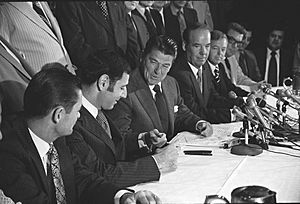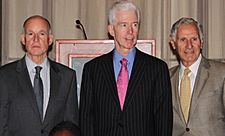George Deukmejian facts for kids
Quick facts for kids
George Deukmejian
|
|
|---|---|
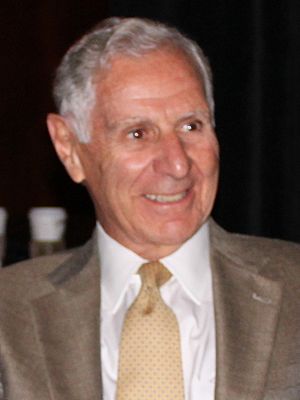
Deukmejian in 2010
|
|
| 35th Governor of California | |
| In office January 3, 1983 – January 7, 1991 |
|
| Lieutenant | Leo T. McCarthy |
| Preceded by | Jerry Brown |
| Succeeded by | Pete Wilson |
| 27th Attorney General of California | |
| In office January 8, 1979 – January 3, 1983 |
|
| Governor | Jerry Brown |
| Preceded by | Evelle J. Younger |
| Succeeded by | John Van de Kamp |
| Member of the California State Senate | |
| In office January 2, 1967 – January 8, 1979 |
|
| Preceded by | Gordon Cologne |
| Succeeded by | Ollie Speraw |
| Constituency | 31st district (1977–1979) 37th district (1967–1977) |
| Member of the California State Assembly from the 39th district |
|
| In office January 7, 1963 - January 2, 1967 |
|
| Preceded by | John C. Williamson |
| Succeeded by | James A. Hayes |
| Personal details | |
| Born |
Courken George Deukmejian Jr.
June 6, 1928 Menands, New York, U.S. |
| Died | May 8, 2018 (aged 89) Long Beach, California, U.S. |
| Political party | Republican |
| Spouse |
Gloria Saatjian
(m. 1957) |
| Children | 3 |
| Education | Siena College (BA) St. John's University, New York (JD) |
| Signature | |
| Nickname | "The Iron Duke" |
| Military service | |
| Allegiance | |
| Branch/service | |
| Years of service | 1953–1955 |
| Rank | |
| Unit | Army JAG Corps |
Courken George Deukmejian Jr. (June 6, 1928 – May 8, 2018) was an American politician. He served as the 35th Governor of California from 1983 to 1991. He was a member of the Republican Party. Deukmejian was the first governor of California with Armenian heritage.
Born in New York, Deukmejian moved to California in 1955. He began his political career there. He was elected to the California State Assembly in 1962. Later, he served in the California State Senate. In 1978, he became the state's 27th Attorney General of California. As Attorney General, he was known for his "tough on crime" approach.
In 1982, Deukmejian was elected Governor of California. He won a close election against Tom Bradley. He was re-elected in 1986 with a larger victory. As governor, he continued his focus on "law and order". During his time, the number of people in California prisons nearly tripled. He also increased spending to build new prisons. Deukmejian retired from politics in 1991.
| Top - 0-9 A B C D E F G H I J K L M N O P Q R S T U V W X Y Z |
Early Life and Education
George Deukmejian was born in Menands, New York. His parents were Armenians who came to the United States in the early 1900s. They had moved from the Ottoman Empire. His father was a rug merchant. His mother worked for Montgomery Ward and later for New York State.
Deukmejian went to local schools. He graduated from Siena College in 1949 with a degree in Sociology. In 1952, he earned a law degree from St. John's University. From 1953 to 1955, he served in the United States Army. He worked in the Judge Advocate General's Corps (JAG), which provides legal services for the Army.
Moving to California
In 1955, Deukmejian moved to California. His sister, Anna Ashjian, lived there. California also had a large Armenian community. His sister introduced him to Gloria Saatjian. She was a bank teller whose parents were also from Armenia.
George and Gloria married on February 16, 1957. They had three children together. Their two daughters were born in 1964 and 1969. Their son was born in 1966.
Political Career in California
After working as a lawyer in Long Beach, California, Deukmejian entered politics. In 1962, he was elected to the California State Assembly. He represented the city of Long Beach.
In 1966, he was elected as a state senator. He served in the Senate from 1967 to 1979. He became the Majority Leader of the California State Senate by 1969. He was a strong supporter of strict crime laws.
He first ran for Attorney General of California in 1970 but did not win. In 1978, he won the election for Attorney General. He served from 1979 to 1983. As Attorney General, he was the state's chief lawyer. He also led an effort to pass a law that had been blocked by the governor. This law was about increasing penalties for serious crimes.
Serving as Governor
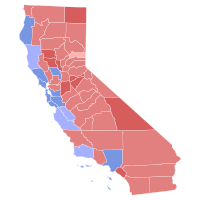
Deukmejian was elected as the Governor of California in 1982. He first won the Republican primary election. He then faced Los Angeles Mayor Tom Bradley in the main election.
Opinion polls before the election showed Bradley in the lead. However, Deukmejian won by a small margin. He received about 100,000 more votes out of 7.5 million cast. This difference between polls and results became known as the "Bradley effect". It describes when voters might say they will vote for a candidate of a different race, but then vote for someone else.
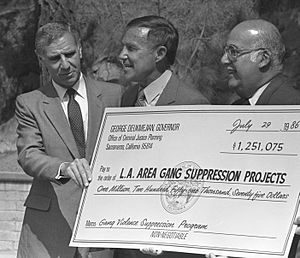
Deukmejian's time as governor was very different from the previous governor, Jerry Brown. He promised not to raise taxes. He also said he was "business friendly." He presented himself as a "law and order" leader. He wanted to fight crime more effectively.
During his two terms, the California State Legislature was mostly controlled by Democrats. Deukmejian was the only Republican holding a statewide office for some time.
In 1984, he vetoed a bill that would have banned discrimination against gay and lesbian people.
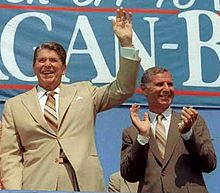
In 1986, Tom Bradley ran against Deukmejian again. This time, Deukmejian won by a much larger margin. He was seen as a moderate to conservative Republican.
His time as governor began during a national economic slowdown. He stopped hiring new state employees. He also limited state government travel. He refused to raise taxes as the legislature wanted. Instead, he cut $1.1 billion from the state budget. A year later, these cuts and a better economy helped California have a budget surplus.
His 1985 budget increased spending for highways. However, it cut funding for education, health, and environmental programs. This led to some criticism. Three years later, Deukmejian faced another budget problem. In 1989, he supported raising the state's minimum wage.
Deukmejian was known for being tough on crime. When he was in the legislature, he helped write California's laws about serious criminal penalties. As governor, he opposed some judges who consistently voted against these penalties. He appointed new judges to the state's Supreme Court. Under his leadership, the number of people in California prisons nearly tripled. He also increased spending to build new prisons.
In 1988, Vice President George H. W. Bush thought about Deukmejian as a possible running mate for president. However, Deukmejian decided not to be considered. He did not want to leave his job as governor.
Deukmejian did not run for a third term as governor in 1990. He was the last governor not affected by the two-term limit. This limit was passed by voters in 1990.
In 1989, Governor Deukmejian signed a law. It allowed uninsured Californians with serious illnesses to buy health insurance. This was paid for by tobacco tax money. In 1991, in his last days in office, he vetoed a tax break bill. This bill was for companies building solar energy plants. This veto led to the bankruptcy of one such company.
After Being Governor
After leaving office, Deukmejian became a partner at a law firm. He worked there from 1991 until he retired in 2000. He also served on special committees. One committee worked to improve the California prison system. Another helped reform the city government in his hometown of Long Beach.
In 2013, a courthouse in Long Beach was named in his honor. In 2008, he received an honorary law degree from California State University, Long Beach. This was for his support of education and state law. In 2015, he was given the Key to the City of Long Beach.
Death
Deukmejian lived in the Belmont Park neighborhood of Long Beach for over 51 years. He passed away at his home on May 8, 2018. He was 89 years old. California Governor Jerry Brown shared his condolences. He said Deukmejian was a popular governor who made friends across political groups.
Images for kids
See also
 In Spanish: George Deukmejian para niños
In Spanish: George Deukmejian para niños
 | Kyle Baker |
 | Joseph Yoakum |
 | Laura Wheeler Waring |
 | Henry Ossawa Tanner |


